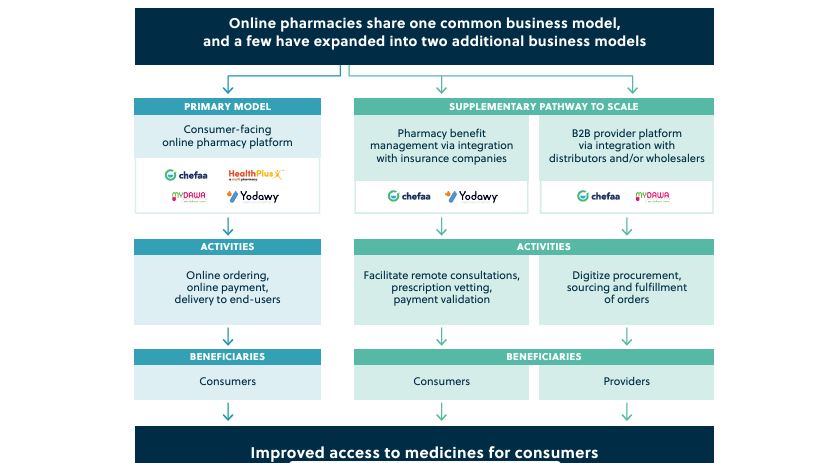- New report identifies 24 leading Africa-focused supply chain innovators who are at the forefront of this transformation.
- These innovators have partnered with over 100 manufacturers and 75 public health institutions, reaching more than 50,000 providers and directly delivering health products to approximately nine million consumers.
- Collectively, these supply chain leaders have generated nearly $200 million in annual revenues.
A new wave of innovation is powering health product access in Africa, reshaping how medical products are accessed across the continent. Despite the formidable challenges posed by economic pressures and declining investments in technology, a select group of innovators is rising to the occasion, delivering solutions that promise to make healthcare more accessible, affordable, and reliable for millions of Africans.
A recent market intelligence report by Salient Advisory, funded by the Gates Foundation, sheds light on these trailblazers, highlighting the innovative approaches they are taking to pioneer health product access in Africa.
“Having tracked health-tech startups for many years, the emergence of a group of leading innovators is exciting to report. Local and global public health communities must increasingly recognize and leverage the innovators in developing reliable and resilient health supply chains,” noted Yomi Kazeem, Engagement Manager at Salient Advisory.
The Rise of Supply Chain Innovators
As the backbone of any healthcare system, supply chains are critical to ensuring that health products reach the people who need them most. The report identifies 24 leading Africa-focused supply chain innovators who are at the forefront of this transformation.
These innovators have partnered with over 100 manufacturers and 75 public health institutions, reaching more than 50,000 providers and directly delivering health products to approximately nine million consumers.
Collectively, these supply chain leaders have generated nearly $200 million in annual revenues, demonstrating the economic potential and impact of their innovations.
Kasha: Leading the Pack in Revenue Generation
One standout among these innovators is Kasha, which reported just over $50 million in annual revenue—the highest among African health supply chain innovators. Kasha’s success lies in its dual approach of selling health products directly to consumers while also supplying pharmacies, hospitals, clinics, and drug shops.
This business model has not only expanded Kasha’s market reach but has also strengthened its revenue streams, positioning it as a leader in health product access in Africa.
Order & Inventory Management: The Most Prominent Innovation Category
Among the innovations spotlighted in the report, Order & Inventory Management solutions emerge as the most prominent category, with 13 innovators operating across 30 African countries. These solutions are critical in ensuring that health products are available where and when they are needed, reducing stockouts, and minimizing the risk of purchasing substandard or counterfeit products.
Field Intelligence, Remedial Health, and Maisha Meds are some of the key players in this space, each serving over 4,000 providers. Their platforms enable pharmacies, clinics, and hospitals to order and resupply medicines and other health products from vetted manufacturers and distributors.
By streamlining the procurement process, these innovators are reducing reliance on open drug markets and helping to ensure that patients receive high-quality, authentic health products.
Notably, three of the leading innovators in this category—Kasha, Maisha Meds, and LifeBank—were founded by women, highlighting the significant role of female leadership in driving health product access in Africa. Their contributions are not only improving healthcare outcomes but also setting a precedent for gender diversity in the tech and healthcare sectors.

Online Pharmacies: Expanding Access and Convenience
Online pharmacies represent another critical innovation in the African healthcare landscape. Serving about nine million customers, these platforms are making it easier and more convenient for Africans to access medicines.
By integrating business-to-business opportunities, leading online pharmacies are also driving scale and reaching more consumers than ever before.
Despite their success, online pharmacies face challenges in expanding access to unserved populations and sustainably reducing prices for patients. The report calls for further research to address these challenges and unlock the full potential of online pharmacies in improving health product access in Africa.
However, the fact that these platforms are already reporting higher median annual revenues of $8.9 million—half of them exceeding $10 million—signals a promising future for this category of innovation.
Product Protection and Visibility: Safeguarding the Supply Chain
In a region where counterfeit medicines pose a significant threat to public health, innovations in Product Protection and Visibility are vital. These solutions, which include mobile authentication and track-and-trace technologies, provide a secure and transparent way to monitor the movement of health products through the supply chain, ensuring their authenticity and reducing the risk of counterfeit products reaching consumers.
Track-and-trace technologies are particularly important in safeguarding health product access in Africa. By offering a transparent and accountable system for tracking the journey of health products from manufacturer to end-user, these innovations are helping to build trust in the healthcare system and protect consumers from the dangers of counterfeit drugs.
Emerging Innovations: Medical Drones and Data Analytics
While still in their infancy, innovations in Medical Drone Delivery and Data Analytics are beginning to make waves in Africa’s healthcare sector. Companies like Zipline, Wingcopter, and Pendulum are partnering with African governments to explore the potential of drone technology in delivering health products to remote and underserved areas.
Although these innovations face high entry barriers in terms of technology and cost, their potential to overcome logistical challenges and improve health product access in Africa is undeniable.
Data Analytics: The Future of Healthcare Decision-Making
Data Analytics, powered by artificial intelligence (AI), is another emerging category that holds promise for the future of healthcare in Africa. By analyzing vast amounts of health data, these solutions can provide insights that inform decision-making, optimize supply chains, and improve patient outcomes.
However, the specialization required to develop and implement these solutions means that they are not yet mainstream across local ecosystems.
Nigeria: A Hub for Health-tech Innovation
Nigeria is emerging as a leader not only in producing health-tech innovations but also in integrating them into public health systems. The report reveals that 29 per cent of the leading innovators are headquartered in Nigeria, where the government is actively collaborating with health-tech innovators to optimize supply chains and improve health product access.
The success of health-tech innovations in Nigeria is largely due to strong partnerships between innovators and government institutions. These collaborations are enabling the scaling of solutions and ensuring that they have a meaningful impact on health product access in Africa.
As other African countries look to replicate Nigeria’s success, the importance of government support and collaboration cannot be overstated.
The Path Forward: Scaling Health Product Access in Africa
The innovations highlighted in Salient Advisory’s report are paving the way for a future where health product access in Africa is no longer hindered by supply chain inefficiencies, counterfeit products, or limited reach.
However, scaling these innovations to ensure that they benefit all Africans will require continued investment, research, and collaboration between the public and private sectors.
With innovators already capturing 57 percent of the funding raised in African health-tech in 2023, there is a clear appetite for investing in solutions that improve health product access in Africa.
Yet, to fully realize the potential of these innovations, it is essential to address the challenges they face, such as high entry barriers, the need for further research, and the integration of new technologies into existing healthcare systems.
Collaboration will be key to scaling these innovations and ensuring their long-term sustainability. By working together, governments, private sector players, and international organizations can create an enabling environment for health-tech innovations to thrive, ultimately improving health outcomes for millions of Africans.

A Healthier Future for Africa
The innovations driving health product access in Africa are a testament to the continent’s resilience and creativity in the face of challenges. As these solutions continue to evolve and scale, they hold the potential to transform healthcare delivery across Africa, making it more accessible, affordable, and reliable for all.
The future of health product access in Africa is bright, and the innovators leading the charge are paving the way for a healthier, more equitable continent.
Read also: July financing for startups in Africa hits record $420M as debt funding grows











